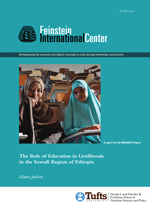What are the links between education and livelihoods in conflict affected areas of the Somali Region of Ethiopia? How can improved education provision contribute to strengthening livelihoods? The BRIDGES project is implemented by Save the Children UK, Mercy Corps and Islamic Relief with funding from DFID, and aims to strengthen the capacity of state and non-state actors in the region to promote peace and stability through the delivery of quality education. BRIDGES is a pilot project and an important aspect of the project is learning lessons to influence future strategies and programming.
This report seeks to understand people’s perceptions of the past and future role of education in the livelihoods of people in the Somali Region of Ethiopia, including the livelihoods of pastoralists, of those exiting pastoralism and those seeking to diversify their livelihoods. There is a general perception that education provides a pathway to economic independence and a route out of poverty. Many professionals and students aspire to use their education to contribute to their communities while others with more limited educational and livelihood opportunities see continuing their education as the key to a successful future. However as increasing numbers of Ethiopian Somalis access education, there is an urgent need to create employment opportunities outside the government sector and encourage and expand private sector business and employment opportunities. Barriers to further education and employment such as discrimination, particularly towards pastoralists and women, also need to be tackled. Otherwise, there may be a growing population of unemployed and disenfranchised youth who no longer see education as offering favorable livelihood outcomes.







